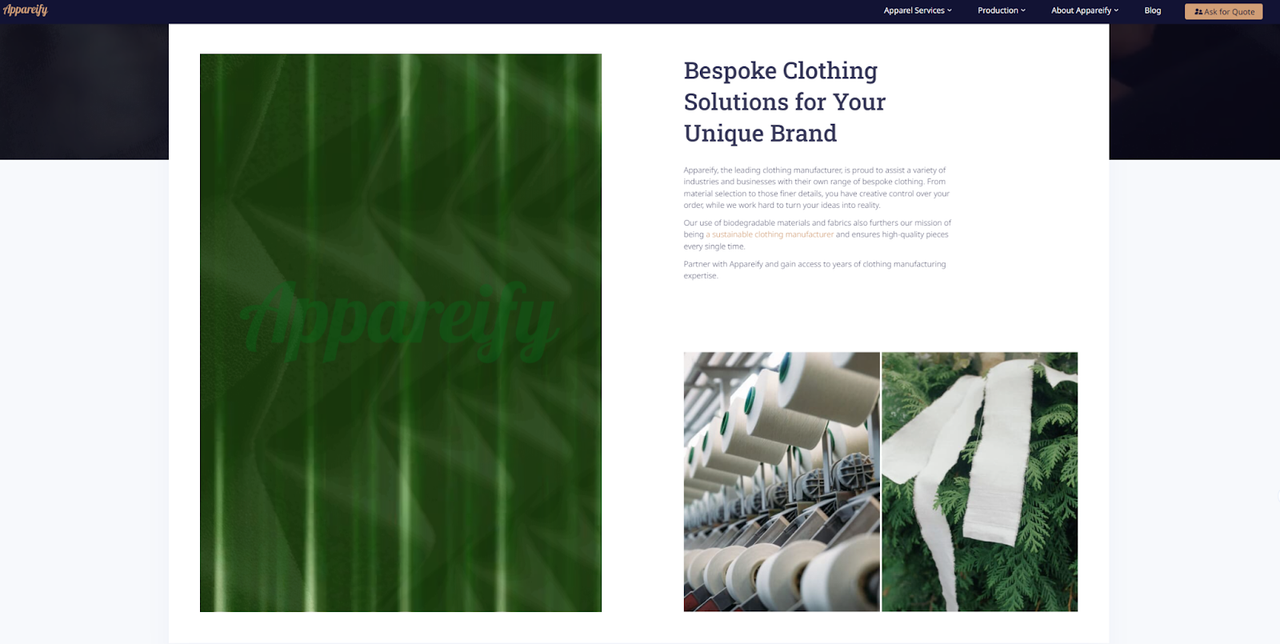Choosing the right clothing manufacturer is a crucial decision for any fashion brand or aspiring designer. The fabric you choose plays a pivotal role in determining the quality and appeal of your garments. With an abundance of options available, finding the perfect clothing manufacturer can be an overwhelming task.
In this blog post, we will guide you through the key considerations to keep in mind when selecting a clothing manufacturer. Whether you’re a seasoned professional or just starting out, this comprehensive guide will provide you with valuable insights to ensure that your fabric truly transforms into fashion.
Contents
- 1. Understanding Your Clothing Manufacturing Needs
- 2. Assessing Your Production Requirements
- 3. Identifying Your Target Market And Customer Base
- 4. Determining Your Budget And Pricing Strategy
- 5. Researching Potential Clothing Manufacturers
- 6. Conducting An Online Search For Clothing Manufacturers
- 7. Seeking Recommendations From Industry Professionals or Trade Associations
- 8. Reviewing Manufacturers’ Websites And Portfolios
- 9. Evaluating Manufacturer Capabilities And Expertise
- 10. Assessing The Manufacturer’s Production Capacity And Lead Times
- 11. Reviewing Their Experience In Producing Similar Garment Types
- 12. Verifying Their Accreditation And Certifications
- 13. Assessing Quality Control Processes And Standards
- 14. Inquiring About The Manufacturer’s Quality Control Procedures
- 15. Understanding Their Approach To Product Testing And Inspection
- 16. Requesting Samples or Visiting Their Production Facility If Possible
- 17. Negotiating Pricing And Terms
- 18. Requesting Detailed Pricing Quotes For Your Specific Garment Requirements
- 19. Discussing Order Minimums, Payment Terms, And Delivery Schedules
- 20. Protecting Intellectual Property And Confidentiality
- 21. Discussing Nondisclosure Agreements And Protection of Proprietary Designs
- 22. Ensuring The Safeguarding of Trademarks And Copyrights
- 23. Clarifying Ownership Rights And Any Exclusivity Agreements
1. Understanding Your Clothing Manufacturing Needs
To successfully select a reliable clothing manufacturer, it is essential to understand your clothing manufacturing needs. This involves assessing your production requirements, identifying your target market and customer base, and determining your budget and pricing strategy.
2. Assessing Your Production Requirements
Before choosing a clothing manufacturer, it is crucial to evaluate your production needs. Consider factors such as the quantity of garments you require, the complexity of the designs, and the desired production timeline. Understanding your production requirements will help you select a manufacturer with the necessary capabilities to meet your needs effectively.
3. Identifying Your Target Market And Customer Base
To choose a clothing manufacturer that aligns with your business goals, it is essential to identify your target market and customer base. Consider factors such as the demographics, preferences, and purchasing behavior of your target audience. This information will help you select a manufacturer capable of producing garments that resonate with your target market.
4. Determining Your Budget And Pricing Strategy
Budget plays a crucial role in the selection process, so it is vital to determine your budget and pricing strategy upfront. Consider your overall business financials, including costs associated with manufacturing, shipping, and marketing. Understanding your budget and pricing strategy will help you select a manufacturer that can meet your financial requirements without compromising quality.
5. Researching Potential Clothing Manufacturers
Once you have a clear understanding of your clothing manufacturing needs, it’s time to do some research to find the best clothing manufacturer for your business, for instance, Appareify is one of our top picks. This involves conducting an online search, seeking recommendations from industry professionals or trade associations, and reviewing manufacturers’ websites and portfolios.

6. Conducting An Online Search For Clothing Manufacturers
The internet is a valuable resource for finding potential clothing manufacturers. Utilize search engines and online directories to identify manufacturers that meet your criteria. Pay attention to the manufacturers’ websites and gather information about their services, production capabilities, and previous clients. This research will help you create a shortlist of potential manufacturers.
7. Seeking Recommendations From Industry Professionals or Trade Associations
Industry professionals and trade associations can provide valuable insights and recommendations for selecting a reliable clothing manufacturer. Reach out to individuals and organizations within your industry network and inquire about their experiences with manufacturers. Their recommendations can help you identify trustworthy and reputable manufacturers.
8. Reviewing Manufacturers’ Websites And Portfolios
Once you have a list of top clothing manufacturers, take the time to review their websites and portfolios. Look for indications of their expertise, production capabilities, and the types of garments they specialize in. Pay attention to any certifications or accreditations they may have, as these can demonstrate their commitment to quality and professionalism.

9. Evaluating Manufacturer Capabilities And Expertise
To ensure the selection of a reliable clothing manufacturer like Appareify, it is crucial to evaluate their production capabilities and expertise. This involves assessing their production capacity and lead times, reviewing their experience in producing similar garment types, and verifying their accreditation and certifications.
10. Assessing The Manufacturer’s Production Capacity And Lead Times
Manufacturers differ in terms of their production capacity and lead times. Assess whether the manufacturer has the necessary resources and infrastructure to handle your production requirements efficiently. Additionally, consider their lead times to ensure they can deliver the garments within your desired timeline.
11. Reviewing Their Experience In Producing Similar Garment Types
The experience of a clothing manufacturer in producing similar garment types is a significant factor to consider. Have they manufactured garments comparable to yours before? Familiarity with your garment type can help prevent potential production issues and ensure a smoother manufacturing process.
12. Verifying Their Accreditation And Certifications
Accreditation and certifications can serve as indicators of a manufacturer’s expertise and commitment to quality. Look for certifications such as ISO standards or specific industry certifications that are relevant to your garment type. Verified accreditations can provide assurance that the manufacturer adheres to industry best practices.
13. Assessing Quality Control Processes And Standards
To ensure the production of high-quality garments, it is essential to assess a manufacturer’s quality control processes and standards. This involves inquiring about their quality control procedures, understanding their approach to product testing and inspection, and requesting samples or visiting their production facility if possible.
14. Inquiring About The Manufacturer’s Quality Control Procedures
Quality control procedures are crucial for maintaining consistent product quality. Inquire about the manufacturer’s quality control processes to ensure they have systematic methods in place to monitor and maintain quality throughout the manufacturing process. This includes raw material inspection, in-process quality checks, and final product inspections.
15. Understanding Their Approach To Product Testing And Inspection
Product testing and inspection are essential for identifying any defects or issues before the garments reach the market. Understand the manufacturer’s approach to testing and inspection, including the types of tests conducted and the frequency of inspections. A manufacturer committed to rigorous testing will likely produce garments of higher quality.
16. Requesting Samples or Visiting Their Production Facility If Possible
To get a firsthand look at the manufacturer’s quality standards, consider requesting samples or, if feasible, visiting their production facility. Sample garments can provide insights into the manufacturer’s workmanship, fabric quality, and attention to detail. A visit to the production facility allows you to assess their working conditions and quality control processes directly.
17. Negotiating Pricing And Terms
Once you have assessed the manufacturers’ capabilities, it is time to negotiate pricing and terms. This involves requesting detailed pricing quotes, discussing order minimums, payment terms, and delivery schedules, and seeking opportunities for cost savings or value-added services.
18. Requesting Detailed Pricing Quotes For Your Specific Garment Requirements
To accurately compare pricing between manufacturers, provide them with detailed information about your specific garment requirements. Request comprehensive pricing quotes that include all costs related to manufacturing, including materials, labor, and any additional services. This will help you make informed decisions about the cost-effectiveness of each manufacturer.
19. Discussing Order Minimums, Payment Terms, And Delivery Schedules
Discussing order minimums, payment terms, and delivery schedules is essential for a successful partnership. Clarify any minimum order quantities and ascertain whether they align with your production needs. Also, define payment terms and ensure they are reasonable and feasible for your business. Finally, discuss delivery schedules to keep the production process in sync with your goals.
20. Protecting Intellectual Property And Confidentiality
When entering into a manufacturing partnership, it is crucial to protect your intellectual property and maintain confidentiality. This involves discussing nondisclosure agreements (NDA), ensuring the safeguarding of trademarks and copyrights, and clarifying ownership rights and any exclusivity agreements.
21. Discussing Nondisclosure Agreements And Protection of Proprietary Designs
To protect your intellectual property, discuss and establish a nondisclosure agreement with the manufacturer. An NDA ensures that confidential information, such as proprietary designs or marketing strategies, remains secure. This legal agreement provides a foundation for trust and safeguarding your valuable assets.
22. Ensuring The Safeguarding of Trademarks And Copyrights
If you have trademarks or copyrighted designs, ensure the manufacturer respects your intellectual property rights. Clear communication and documentation regarding the usage and protection of trademarks and copyrights are essential. Verify that the manufacturer has systems in place to prevent unauthorized use or infringement of your intellectual property.
23. Clarifying Ownership Rights And Any Exclusivity Agreements
It is important to clarify ownership rights and any exclusivity agreements with the manufacturer to avoid potential conflicts in the future. Establish a clear understanding of who retains ownership of the designs, patterns, or molds used in production. Additionally, discuss exclusivity agreements if you require the manufacturer to produce garments exclusively for your brand.
Conclusion
Selecting a reliable clothing manufacturer such as Appareify requires careful consideration and thorough research. By understanding your clothing manufacturing needs, researching potential manufacturers, evaluating their capabilities, considering ethical standards, assessing quality control processes, negotiating pricing and terms, protecting intellectual property, building a long-term relationship, and finalizing your decision, you can maximize the chances of a successful manufacturing partnership.
Emphasize the importance of thorough research and evaluation in choosing a clothing manufacturer, encouraging proactive communication, and ongoing collaboration with the selected manufacturer. With the right manufacturer, you can bring your vision to life and establish a solid foundation for your clothing brand’s success.




